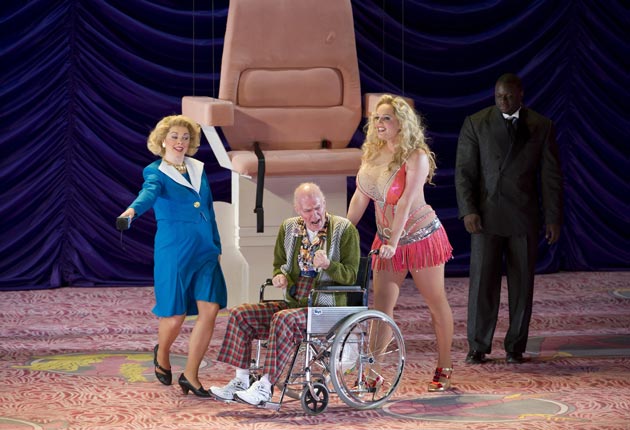David Lister: No need to mind your Ps and Qs at the opera – just the high Cs
The Week in Arts

Looking up the award-laden film The King's Speech on the Odeon website, I was intrigued by a warning accompanying it. The warning says that the film "contains strong language in a speech therapy context". I've never seen a warning worded quite like that. It will, I suspect, be imitated henceforth by studios and movie producers keen to avoid the wrath of fretful parents and the British Board of Film Classification. Will there indeed ever be a simple case of bad language in a movie again?
Perhaps True Grit will contain a warning of strong language "in a Wild West retribution context" and Blue Valentine will admit to strong language "in a marital breakdown context". The Fighter surely will be allowed swearing "in a contact sport context", and who could begrudge Black Swan the odd four-letter word "in a dance class filled with intense rivalry among ballerinas context"?
Good luck to The King's Speech at the Oscars next weekend, and if it wins nothing else, it should certainly be given "the most novel excuse in the history of cinema" award.
Attitudes are certainly changing to strong language in various art forms. Some Downing Street staff must have taken a gulp on Thursday when it was announced that the Tracey Emin artwork the Prime Minister had commissioned for No 10 was going to be a neon installation. It's a bit of a gamble when you consider the directness of language in some of Emin's oeuvre. But she says she will be conscious of the location's use and history in her choice of words. Besides, who could object to strong language in a "Government keen to get down with contemporary artists" context?
The most striking change of attitude, though, also came on Thursday when Anna Nicole opened at the Royal Opera House. It wasn't just the bras, trainers and bottles of medication dotted around the lobby, or the Covent Garden curtain transformed to garish pink that marked out this operatic departure and sensational evening. It was a libretto liberally splattered with F-words and C-words, beautifully modulated by the Royal Opera's chorus and stars.
I felt beforehand that to hear a soprano swear repeatedly, and a tenor give a new meaning to reaching a high C, would be odd and uncomfortable. Not a bit. With stage settings that included a trailer park, drug-fuelled parties and a lap-dancing club, it would have been odd not to have appropriate language.
What was fascinating was how quickly it felt not just dramatic but operatic. Opera's language might never be the same again now that this barrier has been crossed. New operas are likely to be as street-conscious as new plays, and they can be so without sacrificing the essential beauty of great singing. It's not just the less interesting and hardly original issue of strong language on a stage; it's a much newer question of whether strong language can work in an art form equated with classical beauty.
The answer is that it does. No one should object to this strong language in a "witty and powerful contemporary opera staged by a management keen to encourage new audiences" context.
Bring on the official war artists
War artists have a long tradition, but the idea of a war singer is a new one. The Imperial War Museum is considering commissioning the rock star PJ Harvey to travel to conflict zones, following her acclaimed new album, Let England Shake. The album is Harvey's emotional and uncompromising response to living through a period of war in the Middle East and to tales of older campaigns.
Harvey is reportedly keen, and we should be keen too. Why should it just be painters who are sent to war zones to collect first-hand evidence for subsequent work? Rock musicians would probably reach a larger audience, and a younger one too. And why stop at rock? Playwrights, poets and novelist are also deserving of the Imperial War Museum's funding and official sanction.
Indeed, following Anna Nicole's success, why not send an official war composer to a war zone to write an opera? PJ Harvey should go, but several others should go with her.
And now a growl from our sponsor
The programme for this spring's Brighton Festival is being announced next week, and I hear that one of the main events will be a talk by Julian Assange of WikiLeaks about freedom of information and his recent battles. One of those battles has been an increasingly vitriolic one with The Guardian.
His words on what really went on behind the scenes in his dealings with the newspaper and its editor, and his true feelings about the paper, should be fascinating to hear, and will, I'm sure, be extensively publicised and fully reported by the Brighton Festival's media sponsor, The Guardian.

Join our commenting forum
Join thought-provoking conversations, follow other Independent readers and see their replies